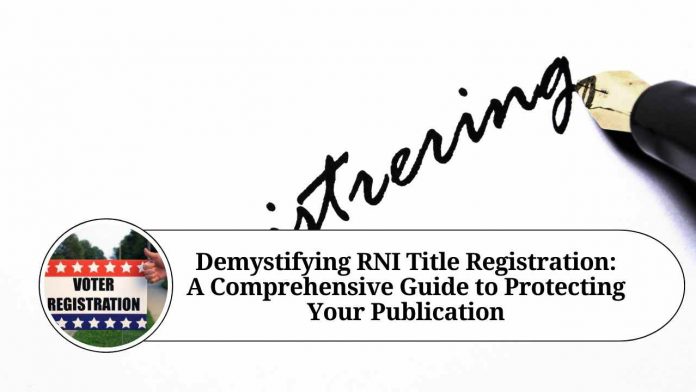Introduction
In a world where intellectual property is highly valued, protecting your creative works is essential. In India, one of the ways to safeguard your creative assets is through RNI (Registrar of Newspapers for India) title registration. Whether you are an author, publisher, or media professional, understanding the process of RNI title registration can help you secure your rights and gain legal recognition. In this blog post, we will explore the key aspects of RNI title registration and provide a step-by-step guide to help you navigate the process.
What is RNI Title Registration?
RNI title registration is a system in India that allows individuals, organizations, and publishers to register their newspapers, magazines, and other periodical publications. The primary objective of RNI is to maintain a comprehensive database of publications, ensuring transparency, credibility, and legality within the Indian media landscape. By registering with RNI, publishers can establish their ownership over a title and receive protection under various laws.
Benefits of RNI Title Registration
- Legal Protection: Registering your title with RNI provides legal recognition and protection. It establishes your ownership and helps prevent unauthorized use or infringement of your publication’s name.
- National and International Recognition: RNI registration enhances your publication’s credibility by providing national and international recognition. It allows you to establish your brand identity and build trust among readers and advertisers.
- Access to Government Schemes: Registered publications often have access to various government schemes, including advertisements, subsidies, and other support systems. RNI registration can open doors to such benefits.
- Copyright Protection: RNI title registration aids in copyright protection by providing evidence of your ownership over the publication. This is particularly crucial if you plan to take legal action against infringement or plagiarism.
Step-by-Step Guide to RNI Title Registration
Step 1: Determine Eligibility Ensure that your publication meets the eligibility criteria specified by RNI. This includes requirements related to periodicity, minimum number of pages, and other relevant guidelines. Familiarize yourself with the necessary documents and information you’ll need to provide during the registration process.
Step 2: Application Submission Obtain the application form for title registration from the RNI website or their office. Fill out the form accurately, providing all the required details, including the title of the publication, address, periodicity, language, and other pertinent information. Attach the necessary supporting documents, such as a declaration form, affidavit, and any additional proofs as specified.
Step 3: Verification and Inspection After submitting the application, RNI may conduct a verification and inspection process to ensure compliance with the guidelines. This may involve physical inspection of the premises, scrutiny of documents, and assessment of the publication’s content and intent.
Step 4: Payment of Fees Once your application is verified, you will be required to pay the prescribed fees for title registration. The fee structure varies depending on factors such as periodicity, language, and number of pages. Ensure that you pay the fees within the specified timeframe to avoid any delays or complications.
Step 5: Issuance of Registration Certificate Upon successful completion of the verification process and fee payment, RNI will issue a registration certificate for your publication. This certificate serves as proof of registration and should be preserved for future reference and legal purposes.
Conclusion
RNI title registration is a crucial step in protecting your creative works and establishing your presence in the Indian media landscape. By following the step-by-step guide outlined in this blog post, you can navigate the registration process with confidence and secure the legal recognition and protection that your publication deserves. Remember to stay updated with any changes in the guidelines and requirements set forth by RNI to ensure ongoing compliance and protection for your title.
Read more useful content:
Frequently Asked Questions (FAQs)
Q.What is RNI title registration?
RNI title registration is a system in India that allows publishers to register their newspapers, magazines, and other periodical publications to establish ownership and receive legal recognition and protection.
Q.Why is RNI title registration important?
RNI title registration is important as it provides legal protection, national and international recognition, access to government schemes, and aids in copyright protection for your publication.
Q.Who is eligible to apply for RNI title registration?
Publishers, individuals, and organizations who meet the eligibility criteria specified by RNI, including periodicity, minimum number of pages, and other guidelines, can apply for RNI title registration.
Q.What documents are required for RNI title registration?
The required documents may include the application form, declaration form, affidavit, proof of ownership, and other supporting documents as specified by RNI.
Q.How can I obtain the application form for RNI title registration?
You can obtain the application form for RNI title registration from the RNI website or by visiting their office in person.
Q.Is there a fee for RNI title registration?
Yes, there is a prescribed fee for RNI title registration. The fee structure varies based on factors such as periodicity, language, and number of pages.
Q.How long does the RNI title registration process take?
The duration of the registration process can vary, but it generally takes several weeks to months, depending on the verification and inspection process conducted by RNI.
Q.Can I register multiple titles under RNI?
Yes, you can register multiple titles under RNI by submitting separate applications for each publication.
Q.What happens after my application is approved?
After your application is approved and the required fees are paid, RNI will issue a registration certificate for your publication, serving as proof of registration.
Q.Is RNI title registration valid indefinitely?
No, RNI title registration is not valid indefinitely. It is typically valid for a specific period and needs to be renewed periodically to maintain its legal status.




















